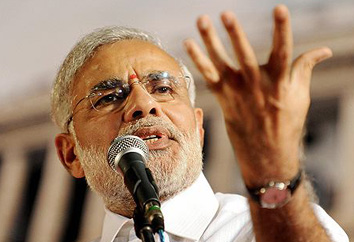
Ahmedabad, August 27: Gujarat Chief Minister Narendra Modi on Sunday slammed the Congress for what he called the country's "durdasha" (mismanagement) and urged the Gujarat BJP Mahila Morcha to prevent the Congress from coming to power in the state.
"Congress is campaigning for 'change of direction, change of situation' in Gujarat. But due to the bad direction of the Congress, our country is in a bad situation at present. You will not let that atmosphere of 'durdasha' enter our soil," he said while addressing a gathering of BJP Mahila Morcha in Gandhinagar.
He also took a dig at the Congress for being "intolerant" to criticism. He mentioned a circular of the Gujarat Congress banning a regional TV channel from covering its events.
"Journalists on Twitter, who spoke against Congress, were blocked. Here they banned a TV channel. Their crime is that they exposed cracks in the 'ghar nu ghar' (own your home) scheme of the Congress. Yet this party talks about democracy," he said.
He urged them to remember the Emergency imposed by late prime minister Indira Gandhi in the 1970s when civil freedoms were suspended and a reign of terror was unleashed.
"Remember the days of Indira Gandhi, when she attacked democracy.
There was widespread fear of the Maintenance of Internal Security Act (MISA), which was repealed in 1977. People were jailed, but they voted her out," Modi added.
He exhaulted BJP Mahila Morcha members to focus at the booth level for the forthcoming assembly elections in the state, which is likely to be held in December this year.
"Elections are won at the booth level. If women decide and bring at least 300 votes per booth for BJP, we will emerge victorious," he said.





Comments
Add new comment